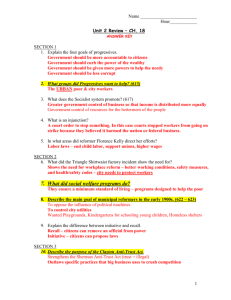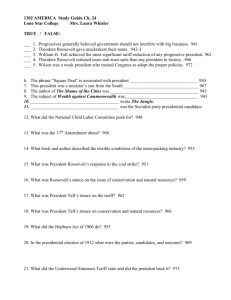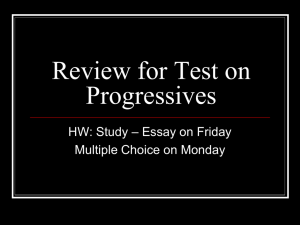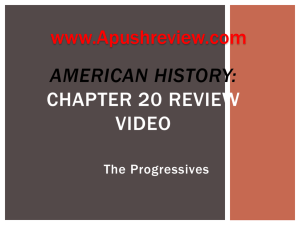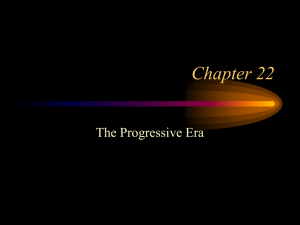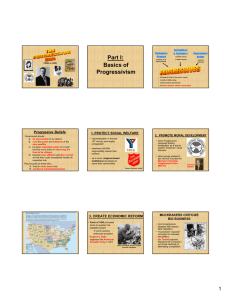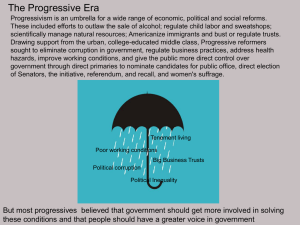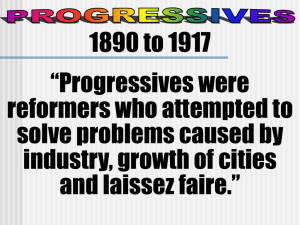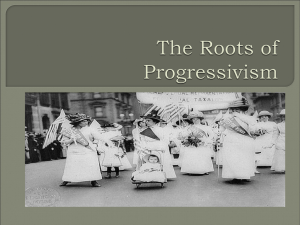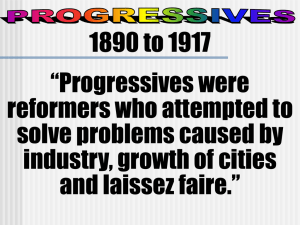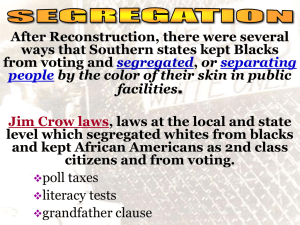Progressivism - Miami Beach Senior High School
advertisement
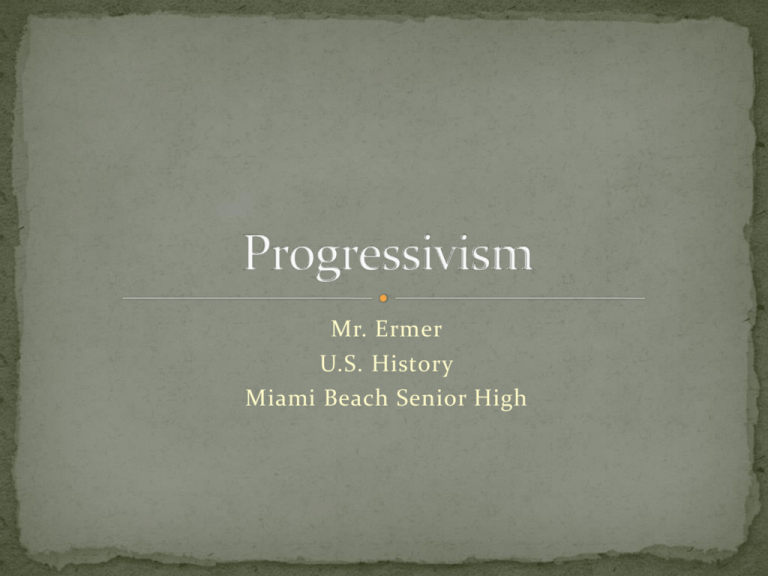
Mr. Ermer U.S. History Miami Beach Senior High Saw problems in industrial society, wanted to fix them Problem #1: Laissez-Faire Economics Progressives came from both political parties Middle class, educated, urban Western farmers African-Americas (NAACP) Muckrakers: journalists who investigate social problems Upton Sinclair’s The Jungle exposes Meat Packing Industry Gov’t needs to fix problems, but gov’t also needs fixing Mistrust of political machines Direct election of Senators, Income Tax, Inclusion Progressives did not always agree on how to fix probs. Amendment XVI: Income Tax (1913) Amendment XVII: Direct election of Senators (1913) Amendment XVIII: Prohibition (1919) Repealed by Amendment XXI in 1933 Amendment XIX: Women’s Suffrage (1920) Make gov’t more efficient, like businesses Reforms to city government City Commission or City Council with Managers Democratic Reforms: Direct Primaries Initiative Referendum Recall Woman Suffrage: giving women the right to vote When Congress passed the 14th and 15th Amendments, women try to be included…Congress refuses. Two strategies emerge: National Woman Suffrage Assoc.: Constitutional Am. American Woman Suffrage Assoc.: State laws for voting 1890: Both groups merge into NAWSA Women march, picket, and protest for suffrage 1918-19: Congress passes suffrage amendment August 26, 1920: Nineteenth Amendment ratified Social Problems: crime, illiteracy, alcoholism, child labor, health and safety Industrial Workers of the World (IWW) pushes strikes States pass laws restricting child labor and compulsory public education Adult working conditions were also bad: Worker’s Compensation Funds Supreme Court gives gov’t right to limit working hours for women, not for men Triangle Shirtwaist Co. Fire, new labor laws passed Zoning laws and health codes Progressives notice many problems stem from alcohol Temperance movement: advocates ending alcohol abuse/consumption/production 1911: Women’s Christian Temperance Union has 250,000 members (Frances Willard) Prohibition: laws banning the manufacture, transportation, and sale of alcoholic beverages Sherman Anti Trust Act of 1890: Break up big businesses to allow for more competition Some just want businesses better regulated, not busted Interstate Commerce Commission (ICC)-Railroads Eugene V. Debs: advocates socialism for businesses that affect everyone Ran for president in 1912, won over a million votes Consumer Protections (FDA) Meat Inspection Act Pure Food & Drug Act Reduced protective tariff rates Federal Reserve Act The Square Deal Targets Railroads with Interstate Commerce Act (ICC) Regulation decreased by court decisions, weakens ICC Weak Hepburn Act not enough for Progressives, strengthens ICC Pure Food & Drug Act Conservation of Nature Adds large tracts of land to National Park System National Reclamation Act (Newlands Act) Construction of dams, reservoirs, and canals Hetch Hetchy Dam Controversy Pinchot vs. Muir—dam ultimately built, but conservation grows The troubled succession 1908: wins election against Democrat William Jennings Bryan Economic policy Moves to lower protective tariffs Old Guard Republicans fight back with Payne-Aldrich Tariff 1912: Children’s Bureau created to protect children Conservation Replaces Sec. of Interior Garfield with Richard Ballinger Ballinger-Pinchot dispute over coal lands in Alaska Taft loses support of Progressives and Roosevelt Roosevelt vs. Taft Roosevelt’s “New Nationalism”—aggressive gov’t regulation 1912: Wilson (D), Taft (R), & Roosevelt (P) run for pres. Taft & TR split vote, Wilson elected by huge margins Wilson’s “New Freedoms” Aimed at destroying monopolies on power Federal Trade Commission Act Lower protective tariffs (Underwood-Simmons Tariff ) Federal Reserve Act 12 Regional Banks, owned by their member banks in regions Federal Reserve Board, headed by chairman to monitor/regulate national economy Child Labor Laws Keating Owens Act places tax on child labor produced goods
